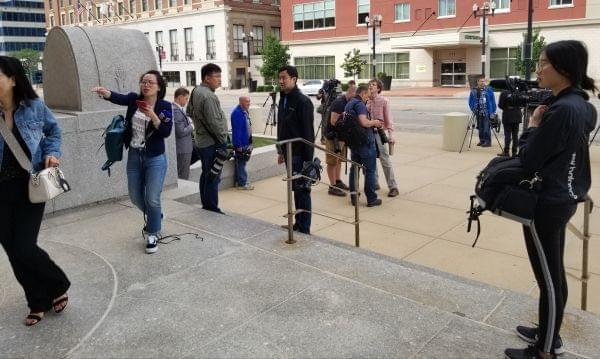Defense Attorneys Admit Christensen Killed Visiting Scholar

News media workers gathering outside the Federal Building & U.S. Courthouse in Peoria, for the start of opening arguments in the trial of Brendt Christensen. Tanya Koonce/Illinois Public Media
Opening statements took an unexpected turn, in the Brent Christensen capital murder trial in Peoria Wednesday. Federal public defender George Taseff said that Christensen is responsible for the death of University of Illinois visiting scholar Yingying Zhang, despite his “not guilty” plea.
Christensen is on trial in U.S. District Court for the 2017 kidnapping and murder of Zhang, who came from China to teach and do research at the University’s College of Agricultural, Consumer and Environmental Sciences.
Taseff told the jury that they must consider the details of what exactly happened, because the prosecution’s claims are questionable and their client’s life is on the line. Christensen could face the death penalty, if convicted in federal court of murder in the course of a kidnapping.
Meanwhile, the prosecution’s lead attorney, Eugene Miller, said that on June 9th, 2017, Zhang missed a connecting bus at a U of I campus bus stop, on her way to sign a new apartment lease, when surveillance video showed her getting into an SUV, which investigators determined belonged to Christensen.
Miller told the jury that Christensen tied up the petite Zhang, took her back to his apartment and disabled her phone, soon after he picked her up. There, they say Christensen killed the 26-year-old Zhang.
Miller said the blood evidence showed it was a gruesome murder. He told jurors that Christensen raped and choked Zhang, before striking her in the head with a Louisville Slugger baseball bat, stabbing and finally, decapitating her.
In addition, Miller said they had evidence that Christensen had researched techniques for abduction, had an obsession with serial killers such as Ted Bundy, was practicing dominant-submissive acts and had purchased a six-foot long duffle bag from Amazon that arrived days before he picked her up in his black Saturn Astra.
Zhang’s long-time boyfriend, Xiaolin Hou was one of the first prosecution witnesses to take the stand. Hou, who had just graduated from Peking University with his PhD in environmental engineering, testified that the two had first met as undergraduate students, and were planning to be married in October 2017. He told jurors that Zhang was planning to return China to become a professor after finishing her PhD, also in environmental engineering.
Hou and other prosecution witnesses who testified Wednesday laid out the last documented steps of Zhang’s life, the timeline of her disappearance and the course of the investigation that led investigators to Christensen. They included U of I police officer Charles Hoskins, who took the first report that Zhang was missing; U of I Police Telecommunicator Kenny Costa, who identified CUMTD surveillance video showing Zhang getting into an SUV; and U of I Police Sgt. James Carter, who noted a damaged hubcap in the video that helped to identify Christensen’s vehicle.
For Thursday’s testimony, scheduled to begin at 9 A.M., prosecutors are planning to call the FBI agent who was a chief investigator in building the legal case against the defendant.
Brendt Christensen is being tried before U.S. District Judge James Shadid in Peoria, after defense attorneys asked that the trial be moved out of Urbana, due to pre-trial publicity. The prosecution plans to continue calling witnesses for the rest of the week.
Before opening arguments were heard, Judge Shadid rejected an early morning defense request to continue, or delay, the trial for up to two years. Defense attorneys for Christensen argued that the civil suit filed Tuesday by Zhang’s estate against two University of Illinois counselors would bring forth additional evidence that would be helpful to their case. But Judge Shadid said delaying the trial would not serve the interests of justice. The suit says the two counselors treated Brendt Christensen prior to Zhang’s disappearance, and accuses them of wrongful death and negligence.
